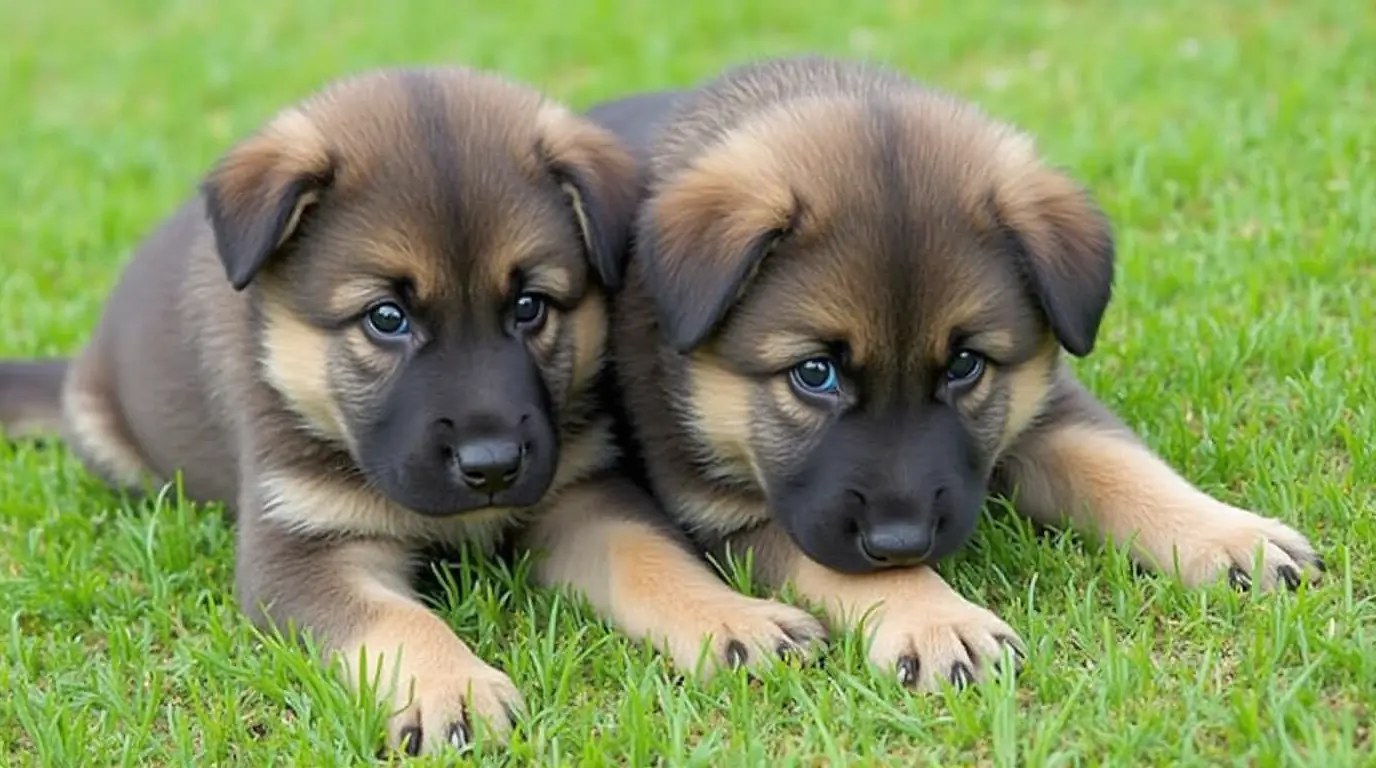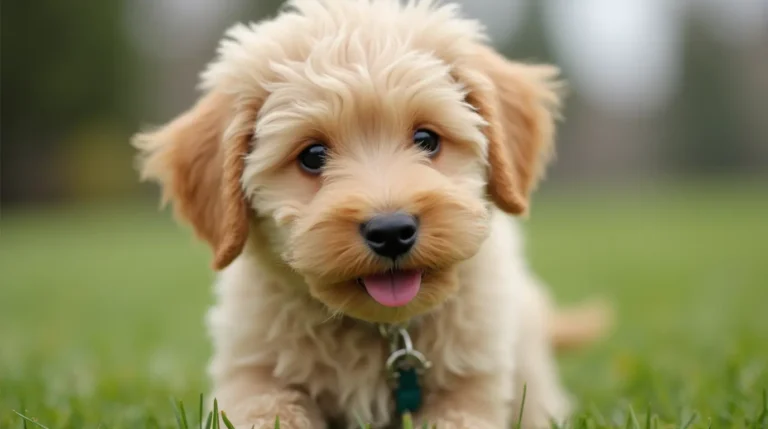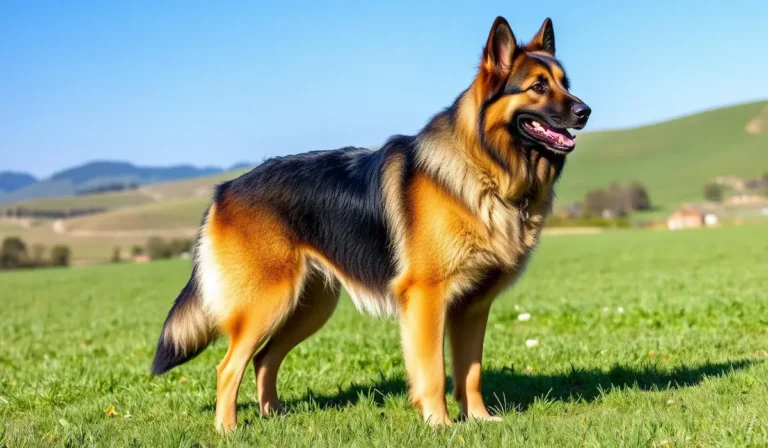5 King Shepherd Puppies for Sale: Find Your Perfect Match
Are you looking for a loyal, smart, and versatile dog? Look no further than the majestic King Shepherd puppies for sale. These large dogs are a mix of German Shepherds and other powerful breeds. They offer strength, trainability, and a loving nature.
As you search for the perfect King Shepherd puppy, you might wonder what makes them special. How can you find the right one for your family? This guide will explore the King Shepherd breed’s heritage and physical traits and how to care for your new furry friend.
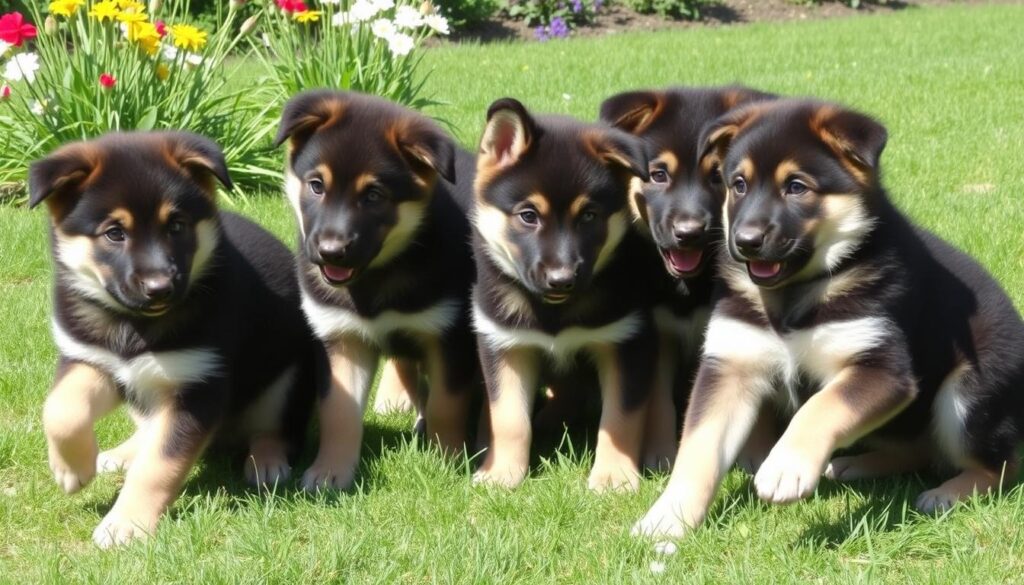
Key Takeaways
- King Shepherd puppies are a rare and sought-after breed, known for their large size, intelligence, and loyal nature.
- These puppies are a cross between German Shepherds and other large breeds, resulting in a powerful and protective companion.
- When searching for King Shepherd puppies for sale, it’s essential to consider reputable breeders who prioritize health and temperament.
- King Shepherd puppies require specialized care and training to ensure they grow into well-adjusted, well-behaved companions.
- Preparing your home and lifestyle for a King Shepherd puppy is crucial to providing a nurturing environment for your new furry family member.
Understanding the King Shepherd Breed Heritage
The King Shepherd breed has a rich history. It combines the German Shepherd with other large, smart dogs. Created in the 1990s, these king shepherd vs German shepherd dogs are bigger and calmer than German Shepherds.
Origins and Development
King Shepherds come from mixing German Shepherds with Alaskan Malamutes and Great Pyrenees. This mix aimed to create giant shepherd puppies that are smart, loyal, and bigger. They also wanted a dog that is calmer.
Breed Standards and Recognition
Even though major kennel clubs don’t officially recognize King Shepherds, they have their own standards. The American King Shepherd Club sets these standards. They cover what a King Shepherd should look like, act like, and be healthy.
Historical Significance
The King Shepherd’s creation is important. It shows how dog breeding has changed over time. By mixing different breeds, the King Shepherd became a special dog for people today.
Related: King Shepherd Puppies for Sale in Ohio

“The King Shepherd is a testament to the power of selective breeding, showcasing the remarkable diversity and potential within the canine world.”
Physical Characteristics of King Shepherd Puppies
King Shepherd puppies are known for their impressive size and fluffy coats. They are a mix of German Shepherds and Shiloh Shepherds. Their thick double coats come in various colors, like black, sable, and bi-color.
These puppies grow fast. They can weigh 75-150 pounds and stand 25-31 inches tall. This is bigger than the average German Shepherd, which weighs 50-90 pounds.
King Shepherds are bigger and stronger than German Shepherds. They are great for many tasks and activities. They make excellent companions or working dogs, thanks to their size and strength.

“King Shepherd puppies are the epitome of strength and grace, with a presence that demands respect and admiration.”
King Shepherd vs German Shepherd: Key Differences
Choosing between a black German shepherd and a King Shepherd requires knowing their differences. These breeds share some traits but vary in size, temperament, and health. Prospective owners should be aware of these variations.
Size and Growth Patterns
The King Shepherd vs German Shepherd comparison shows that King Shepherds are larger and more muscular. They can grow up to 27 inches tall and weigh 90 to 150 pounds. German Shepherds are smaller, reaching 22 to 26 inches and weighing 65 to 90 pounds. Size is a key factor in choosing a breed based on space and exercise needs.
Temperament Variations
King Shepherds are known for their calm and laid-back nature. They are gentle, making them great for families with children. German Shepherds, however, are more energetic and protective. They need specialized training and socialization to ensure a balanced temperament.
Health Considerations
King Shepherds are less prone to hip and elbow dysplasia compared to German Shepherds. They also live longer, with an average lifespan of 10 to 12 years. German Shepherds have an average lifespan of 7 to 10 years. This longevity is a key factor for those seeking a long-term companion.
The choice between a black German shepherd and a King Shepherd depends on your lifestyle and family needs. Both breeds are intelligent and loyal and make great companions. Understanding their differences helps in making an informed decision.
Related: King Shepherds: The Ultimate Guide to Their Care, Training, and Health
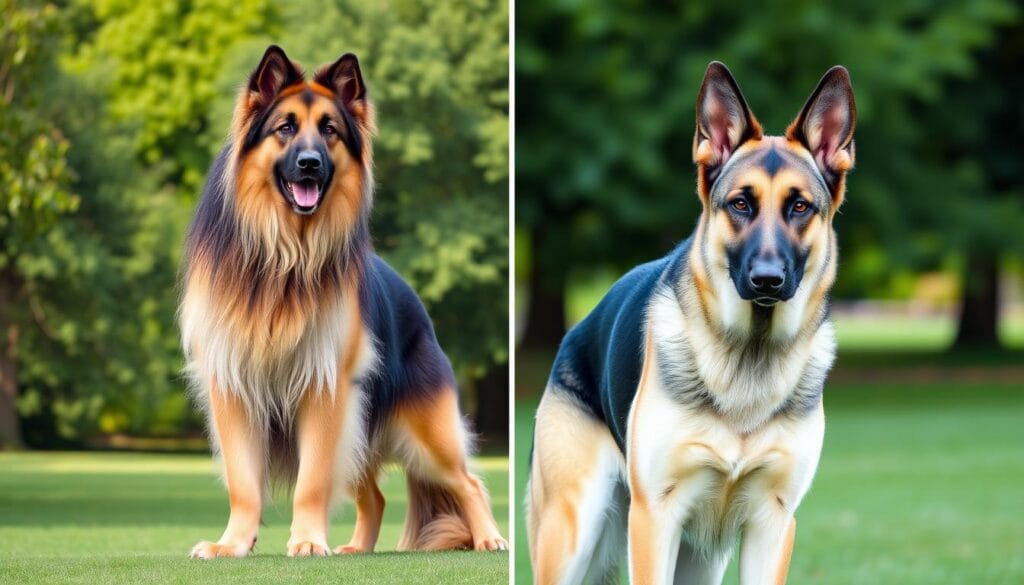
King Shepherd Puppies for Sale: What to Expect
Looking for king shepherd puppies for sale can be tough because they’re rare. Prices vary from $1,500 to $3,000 or more. This depends on the breeder’s reputation and the puppy’s background.
It’s important to research and visit breeders in person to find a well-cared-for puppy. A good breeder will share their breeding methods, health tests, and the puppy’s family history.
| Location | Number of Puppies | Gender | Last Update |
|---|---|---|---|
| NSW | 1 | Female | 1-Dec-2024 |
| SA | 1 | Male | 19-Nov-2024 |
| WA | 1 | Female | 17-Dec-2024 |
| NT | 1 | Male | 15-Dec-2024 |
| VIC | 1 | Female | 30-Nov-2024 |
These puppies come with many benefits. They are vaccinated, wormed, microchipped, and have veterinary checks. They also come with a puppy pack. The breeders are ANKC-registered and provide detailed information about the puppy’s family.
When you buy a King Shepherd puppy, you’ll find different coat types and a focus on health. The breeder will have done health tests and will have started training and socialization. This is key to the puppy’s development.
“Finding a reputable king shepherd breeder is essential for ensuring you get a healthy, well-adjusted pup that fits your lifestyle.”
Evaluating Reputable King Shepherd Breeders
Looking for the perfect King Shepherd puppy means finding a reputable breeder. They should focus on the health and well-being of these family guard dogs. Reputable breeders have the right credentials and follow strict standards.
Breeder Credentials
Check if the breeder is registered with organizations like the King Shepherd Club of America or the North American King Shepherd Registry. These groups set the bar for responsible breeding. They offer resources and support for new King Shepherd owners.
Health Testing Requirements
Good King Shepherd breeders test their parent dogs for health issues. They check for hip and elbow dysplasia and genetic markers. Reputable breeders share their health testing details and provide health certificates for each puppy.
Documentation Standards
Trustworthy King Shepherd breeders give you lots of documentation. This includes pedigree info, registration papers, and lineage details. This paperwork proves the puppy’s heritage and ensures the breeding program’s transparency.
By looking at a breeder’s credentials, health testing, and documentation, you can find a reputable source. This way, you’ll get a healthy, well-bred puppy for your family.
Cost and Investment Considerations
Getting a King Shepherd puppy is a big deal. It costs money and time. The first price you pay is just the start. You also need to think about the costs of caring for a large-breed puppy for its whole life.
The price of a King Shepherd puppy can be between $1,000 and $2,500. This depends on the breeder, the puppy’s family history, and any special features. But, the biggest cost is taking care of your new pet.
- Good dog food and treats can cost $50 to $100 each month. This is especially true for a growing large-breed puppy.
- Vet visits, shots, and health care can cost $500 or more each year.
- Training and supplies like leashes, crates, and toys can cost $200 to $500 in the first year.
- Grooming for king shepherds with their thick fur can be $40 to $80 each time. They need this many times a year.
When planning your budget for a king shepherd puppy, remember these ongoing costs. These big, energetic dogs need lots of space, time, and money. They live for 10 to 12 years.
“The average cost of a Cavalier King Charles Spaniel in the UK is £700, while a Coton de Tulear can cost as much as £1,033.”
Knowing all the costs helps you decide if getting a king shepherd is right for you. It ensures you can give your new pet the best care.
Related: 5 Powerful Reasons King Shepherd Puppies Are the Family Pets You’ve Been Waiting For
Training and Socialization Requirements
As family guard dogs and smart shepherd mixes, King Shepherd puppies need early training. They do best with positive reinforcement, like praise and treats. It’s also important to introduce them to many people, animals, and places between 8 to 16 weeks.
Early Puppy Training
King Shepherd puppies love to learn and do well in obedience classes. Begin with simple commands like “sit,” “stay,” and “come.” Also, socialization should be included by exposing them to new things and helping them grow into confident friends.
Behavioral Development
- It’s vital to watch how older dogs and puppies interact, as accidents can happen.
- Notice any signs of discomfort or stress in dogs, as it can lead to fights.
- Give older dogs breaks from playing with puppies, as puppies can tire them out.
- Use a safe area for puppies to train, reducing fights and providing a safe spot.
- Keep training and using positive reinforcement with both dogs, but separately.
- Don’t count on older dogs to train puppies, as puppies might not understand them.
- Adolescent puppies can upset older dogs’ patience, especially during puberty.
- Get help from a dog trainer who uses positive methods to keep the peace between dogs.
With regular training and careful socialization, King Shepherd puppies can grow into loyal and confident family pets.
Health Screening and Veterinary Care
Being a responsible owner of a King Shepherd puppy means keeping up with health checks and vet care. As a big dog, the King Shepherd might face certain health problems. These need careful watching and steps to prevent them.
Hip and elbow dysplasia are big worries for large-breed puppies. Regular vet visits are key to spotting these issues early. Also, King Shepherds can get bloat, a serious problem. It can be avoided with the right diet, exercise, and vet advice.
Finding a vet who knows about big dogs is a good idea. They can give advice on shots, treatments, and how to keep your King Shepherd puppy healthy.
| Health Condition | Prevalence in King Shepherds |
|---|---|
| Hip Dysplasia | Moderate to High |
| Elbow Dysplasia | Moderate to High |
| Gastric Torsion (Bloat) | Moderate |
| Hypothyroidism | Moderate |
| Von Willebrand’s Disease | Low to Moderate |
Being proactive with health checks and working closely with your vet is crucial. It helps keep your King Shepherd puppy healthy for years to come.
Preparing Your Home for a King Shepherd Puppy
Getting a King Shepherd puppy is thrilling, but it needs preparation for a smooth start. These big, fluffy dogs have special needs. Creating a safe and comfy home helps them thrive.
Essential Supplies
First, get the right supplies for your King Shepherd puppy. You’ll need a big crate, strong toys, and the right-sized food and water bowls. Choose durable items that fit their size. A good leash and collar are key for training and fun outside.
Puppy-Proofing Guidelines
- Secure any loose wires, cords, or small objects that could pose a choking hazard.
- Create a designated play area with durable flooring and plenty of space for your big fluffy dog to explore.
- Ensure that all cleaning supplies, medications, and other potentially toxic items are stored safely out of reach.
- Consider installing baby gates to restrict access to certain rooms or areas of your home.
- Provide ample chew toys to encourage appropriate biting behavior and prevent damage to your belongings.
Preparing your home for a King Shepherd puppy sets the stage for a happy, healthy pet. These big fluffy dogs need lots of space and special care. Be ready to adjust your home to meet their needs.
Nutrition and Dietary Requirements
King Shepherd pups need special food because they grow fast. It’s important to feed them high-quality puppy food made for large breeds. This food helps them grow without gaining too much weight, which can hurt their joints later.
Talk to your vet to figure out how much and how often to feed your puppy. They can help you pick the right food to keep your King Shepherd healthy. Good food is key for their health, happiness, and behavior.
| Dog Food Brand | Protein | Fat | Carbohydrates |
|---|---|---|---|
| Wellness Complete Health Large Breed Puppy | 33.3% | 18.8% | 39.9% |
| Blue Wilderness Puppy Turkey & Chicken Grill | 47.7% | 31.8% | 12.5% |
| Ollie Chicken With Carrots | 30.8% | 11.5% | 49.7% |
| Dr Tim’s Kinesis Puppy | 31.1% | 16.7% | 44.2% |
| American Journey Large Breed Puppy Chicken & Sweet Potato | 33.3% | 13.3% | 45.3% |
Food allergies are common in big dogs, affecting up to a quarter of them. Signs include skin issues, ear infections, and stomach problems. Work with your vet to find the right food for your King Shepherd puppy.
“Elimination diet trials should last at least 8 weeks to identify food allergies, but Dr. Feinstein suggests 12 weeks to span two seasons and eliminate seasonal allergies as the cause of irritations.”
Exercise and Activity Needs
King Shepherd puppies are full of energy and need regular exercise. They are smart dogs that need daily activities to stay happy and healthy. These activities keep their bodies and minds sharp.
Begin with daily walks that get longer and more challenging as they grow. It’s also important to give them lots of playtime with toys and activities. Playing fetch, agility training, and going on hikes are great ways to meet their needs.
- Aim for at least 1-2 hours of daily exercise for your King Shepherd puppy.
- Engage your pup in a variety of physical and mental stimulation, such as obedience training, puzzle toys, and outdoor adventures.
- Monitor your puppy’s exercise needs and adjust as they mature, ensuring their developing joints and bones are not overworked.
Meeting your King Shepherd puppy’s exercise needs helps them become confident and well-rounded. Spend time and effort to give them the right outlets for their energy and instincts.
King Shepherd Growth and Development Stages
Adorable giant shepherd puppies grow fast in their first year. Watching their weight gain is key. You’ll need to adjust their food to help them grow right.
Physical Milestones
King Shepherd puppies grow a lot, doubling or tripling their birth weight early on. By 6 months, they might weigh 50-80 lbs. By 12 months, they could hit 80-100 lbs. It’s important to be patient and watch their growth closely, as it can take up to 2 years.
Mental Development Phases
- Fear Periods: Your puppy may feel more scared, especially at 8-10 weeks and 6-14 months. Positive training is vital during these times.
- Adolescence: Your puppy might act more like a teenager, becoming independent and stubborn between 6-18 months. Keep up the training and give them lots of exercise to handle this.
Knowing about the growth stages of king shepherd puppies for sale helps you support their growth. This way, you can ensure their physical and mental health as they grow up.
Conclusion
King Shepherd puppies are a special mix of size, smarts, and loyalty. They are loved by many families. These dogs have a long history and can be great family pets and guard dogs with proper care.
Thinking about getting a King Shepherd puppy? Make sure you have enough time, money, and effort for their needs. Choose a good breeder and start socializing with them early. This way, they’ll fit right in with your family and protect you well.
King Shepherds are known for their size, hard work, and loyalty. They can be a great addition to your family. With the right care and commitment, you’ll have a lifelong friend by your side.
FAQ
What is a King Shepherd?
The King Shepherd is a big, strong dog. It’s a mix of German Shepherds and other big dogs like Alaskan Malamutes and Great Pyrenees. They were made in the 1990s to be bigger and calmer than regular German Shepherds.
What are the physical characteristics of King Shepherd puppies?
King Shepherd puppies are big, fluffy, and strong. They have a thick double coat in colors like black, sable, and bicolor. They grow fast and can weigh 75-150 pounds, standing 25-31 inches tall.
How do King Shepherds differ from German Shepherds?
King Shepherds are bigger and stronger than German Shepherds. They are calmer and might not get sick as often. They live longer and are good with kids because they are gentle.
Where can I find King Shepherd puppies for sale?
Finding King Shepherd puppies is hard because they are rare. Prices are $1,500 to $3,000 or more. It’s important to find a good breeder and visit them in person.
What should I consider when buying a King Shepherd puppy?
Look for a reputable breeder who is registered and provides health certificates. They should do genetic tests and be open about their breeding. Choose a breeder who socializes and trains their puppies well.
What are the ongoing expenses of owning a King Shepherd?
Owning a King Shepherd costs a lot. You’ll need to pay for food, vet care, training, and grooming. They need a lot of space and exercise, which adds to the cost.
How do I train and socialize a King Shepherd puppy?
Train your King Shepherd puppy early and consistently. Use positive methods and introduce them to people, animals, and places during their socialization period. They are smart and can learn many things, including protecting your family.
What health concerns should I be aware of with King Shepherds?
King Shepherds might get hip dysplasia, elbow dysplasia, and bloat. Find a vet who knows about big dogs and follow a vaccination and care plan to keep your dog healthy.
How do I prepare my home for a King Shepherd puppy?
Get a big crate, durable toys, and the right food and water bowls. Make your home safe for your puppy and get a strong leash and collar.
What are the dietary requirements for a King Shepherd puppy?
King Shepherd puppies need special food for big dogs. Choose high-quality puppy food that helps them grow without harming their joints. Talk to your vet about how much and when to feed your puppy.
How much exercise do King Shepherd puppies need?
King Shepherd puppies need lots of exercise. Walk them, play with them, and do activities that are right for their age. As they get bigger, give them more exercise, but be careful of their joints.

